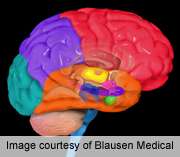But special training may slow the decline, researcher says.
(HealthDay) -- The ability to make decisions in new situations declines with age, apparently because of changes in the brain's white matter, a new imaging study says.
The researchers asked 25 adults, aged 21 to 85, to perform a learning task involving money and also undergo MRI brain scans.
They found that age-related declines in decision-making are associated with the weakening of two specific white-matter pathways that connect an area called the medial prefrontal cortex (located in the cerebral cortex) with two other areas deeper in the brain, called the thalamus and the ventral striatum.
The medial prefrontal cortex is involved in decision-making, the ventral striatum is involved in emotional and motivational aspects of behavior, and the thalamus is a highly connected relay center.
"The evidence that this decline in decision-making is associated with white-matter integrity suggests that there may be effective ways to intervene," study first author Gregory Samanez-Larkin, a postdoctoral fellow in Vanderbilt University's psychology department and Institute of Imaging Science in Nashville, Tenn., said in a university news release. "Several studies have shown that white-matter connections can be strengthened by specific forms of cognitive training."
The study was published April 11 in the Journal of Neuroscience.
Samanez-Larkin undertook this work while a graduate student at Stanford University in Stanford, Calif.
More information: The Society for Neuroscience explains how to keep your brain healthy as you age.
Copyright © 2012 HealthDay. All rights reserved.





















